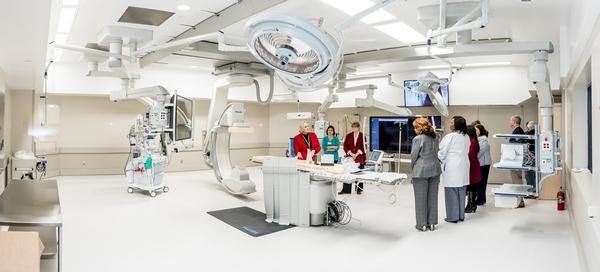The Cape Fear Valley Board of Trustees tour the new Transcatheter Aortic Valve Replacement operating room and Simulation Lab.[Raul F. Rubiera/The Fayetteville Observer]▲
Michael Boose, a hospital trustee and county commissioner, noticed that the eyes of a mannequin in the simulation lab seemed to follow people in the room.
“Just a little strange,” he said.
Then Boose saw a mannequin that simulated a newborn baby.
“Oh, wow,” he said as the mannequin made baby-like movements.
Mark Rose, the simulation lab coordinator, said the mannequin’s sounds also are lifelike.
“You can make it cry,” he said. “When it cries, it sounds just like a real baby.”
Rose said labor and delivery nurses use the simulation lab. They practice dealing with childbirth situations on the mannequin with the moving eyes.
The mannequin can simulate all types of delivery issues, including breech births and C-sections.
“If you don’t do the proper technique, she won’t deliver,” Rose said.
Another mannequin simulates seizures, cardiac arrests and other situations. The mannequin sweats and even froths at the mouth, Rose said.
“They’re pretty limitless in what they can do,” he said.
The simulation lab has four cameras. After the training, the situations can be reviewed in a nearby control room.
“It’ll show them what they were doing,” Rose said. “They come in afterward and get critiqued.”
Dr. Rebecca Schilling, a second-year resident in the hospital’s emergency room, said the simulation lab lets doctors get ready to deal with terrible situations. The facility allows them to learn from mistakes, she said.
“When it comes to real time, you don’t make those mistakes,” he said.
Dr. Chris Benton, also a second-year resident, said the lab gives the doctors valuable practice.
“It provides extra training for life-saving procedures we need to do in the emergency department and elsewhere in the hospital,” he said.
The operating room will be used for Transcatheter Aortic Valve Replacement (TAVR) procedures, which involve using a catheter to replace a narrowed aortic valve that isn’t opening properly.
Cape Fear Valley CEO Michael Nagowski said the hospital will probably do 20 to 25 TAVR procedures a year.
“There is no better equipment in North Carolina than in this room,” he said during a tour of the operating room. “There’s no higher tech OR in the state.”
The trustees unanimously approved credentialing criteria that will allow the hospital to perform the TAVR procedure. Nagowski said the hospital plans to perform its first two of the procedures Dec. 19.
Susan Dees, the chief nursing officer for the hospital, said patients who get the TAVR procedure are 75 percent more likely to be alive 30 days later than those who have open heart surgery.
Patients who needed the TAVR procedure previously would have to have it done at Duke University or the University of North Carolina hospitals.
“It’s a great opportunity for the citizens of Cumberland County not to have to go away to have this done,” Dees said. “We’re very excited about it.”
A lab at Cape Fear Valley Medical Center lets doctors and nurses learn on near-life mannequins that simulate real-life situations.
And a new high-tech operating room will allow the hospital to start performing minimally invasive heart valve replacements this month. The procedures take the place of open heart surgeries and can give some heart patients a greater chance of survival.
The Cape Fear Valley Health System Board of Trustees got a look Wednesday at the lab and the operating room before its meeting.
Hospital officials say the simulation lab is especially useful since Cape Fear Valley is now the state’s fifth-largest teaching hospital. A residency program, which started last year, is expected to create more than 900 jobs and bring more than $570 million in total income into the area over the next 10 years.

